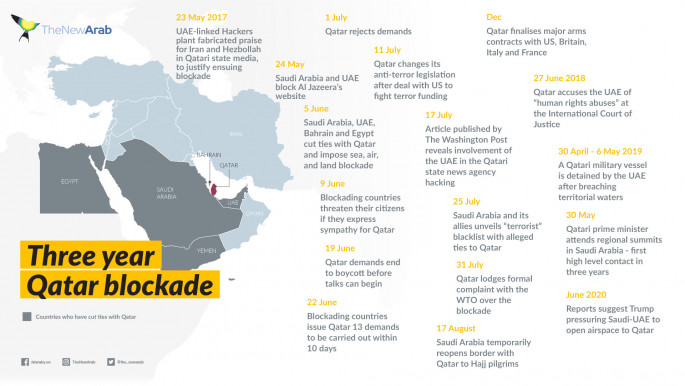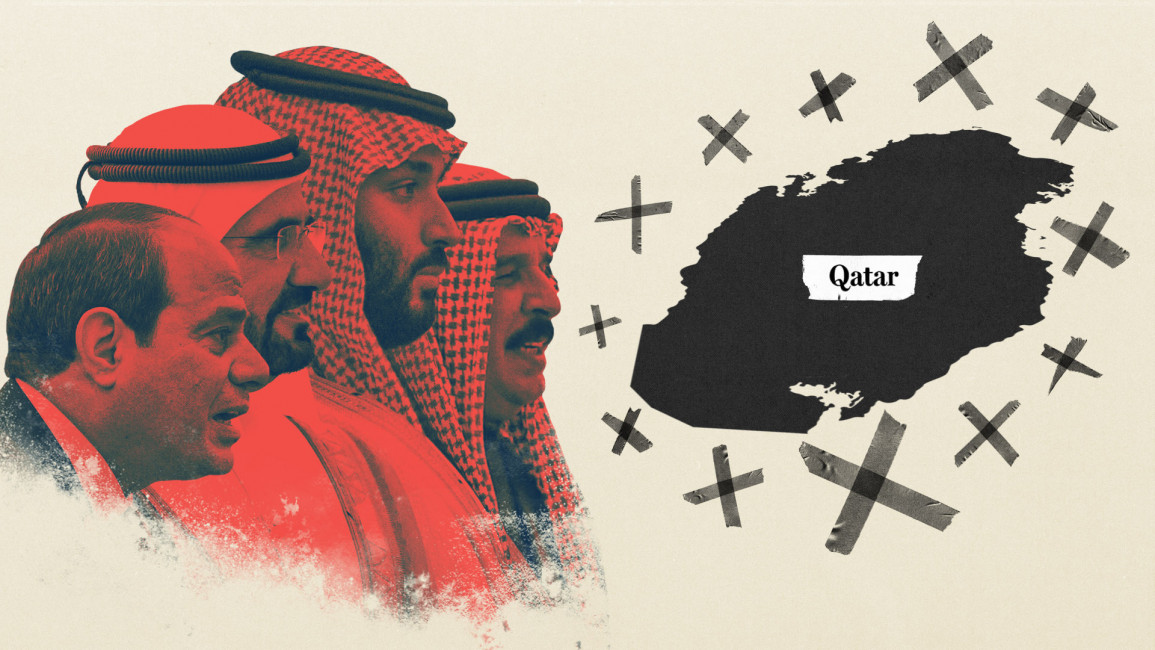
Three years on, the internationalisation of the Gulf crisis has made it harder to resolve
Indeed, the division in the Gulf pitting Bahrain, Saudi Arabia, the UAE and Egypt against Qatar, has been transposed onto a number of conflicts and competing investments outside of the GCC, further institutionalising and solidifying this division.
Since before the start of the crisis in 2017, the two sides of the GCC crisis have backed different actors in regional conflicts or uprisings, from Libya and Sudan to Syria.
In Libya, the consequence of this division is clearest today, with the UAE, according to the UN, having conducted some 850 drone and jet strikes on behalf of eastern Libyan commander Khalifa Haftar since April 2019. Egypt, Saudi Arabia, and the UAE, along with Russia and, more covertly, France, continue to back Haftar and his Libyan National Army as a staunchly 'anti-Islamist' military strongman similar in some ways to the Egyptian president.
The Financial Times reported in April 2020 that the UAE most recently violated an international arms embargo by shipping almost 11,000 tons of jet fuel (considered by the UN to be "combat supplies") to Benghazi at a value of $5 million. The arrival of the fuel coincided with an increase in Haftar-led air strikes and missiles against Tripoli which houses the UN-backed national government. Qatar and Turkey meanwhile continue to back the UN-recognised Government of National Accord based in Tripoli as the conflict continues.
 |
Substantial investments have been made in new alliances and economic partners on both sides, further solidifying a division |  |
Beyond these theatres of conflicts, both sides of the GCC rift are also seeking Red Sea access - Qatar because its access to ports has been blocked by its neighbours, and Saudi Arabia and the UAE since the start of the Yemen war cut off their reliable access to the Red Sea.
In fact, Emirati and Saudi inroads in the Red Sea littoral were so substantial that, at the start of the crisis, Eritrea cut ties with Qatar; notably, Comoros, Mauritania and Senegal followed suit, demonstrating the strength of GCC influence, investments and alliances throughout the continent.
The Red Sea has become the sight of considerable global competition for military basing. Emirati bases have been established in Djibouti, Eritrea, and Somaliland, while Saudi Arabia received permission to build a base Djibouti in 2017.
Article continues after infographic
Twitter Post
|
Meanwhile, Qatar, although it does not have a base on the Red Sea, in March 2018 signed a $4 million agreement on management of the port of Suakin on the Red Sea with Sudan, which has remained neutral in the crisis and continues to enjoy investments from both sides of the rift.
Aside from providing Red Sea access, the Horn of Africa is important for GCC food security, an issue increasingly important for Qatar since the start of the blockade and for the entire Gulf since the Covid-19 pandemic has threatened to disrupt some supply chains.
Saudi Arabia began investing in Tanzanian land for agriculture in 2009, while Qatar in 2018 announced a $500 million investment in Sudanese agriculture for this purpose.
Sudan, which since the 1970s GCC countries have looked to for food imports, has remained neutral in the rift but is still arguably another battle ground for it. After Qatar announced investments in Sudan's ports in March 2018, the Saudi ambassador to Khartoum stated in October 2018 that Saudi investments in Sudan stood at $12 million.
Meanwhile, Saudi Arabia and the UAE are firmly backing behind the military council hoping to manage a post-Bashir future, promising the transitional government $3 billion in aid, in what ICG calls an attempt to lead Sudan "from one military-led regime to another." As in Libya, the blockading states hope to diminish potential political space from which Islamist actors could potentially emerge.
A political rivalry has also emerged in Somalia, which may fuel further conflict. The Emiratis since 2017 have backed governments in Somalia's federal states of Somaliland, Puntland, and Jubaland, while Qatar and Turkey have supported the central government in Mogadishu.
DP World invested over $400 million in the port of Berbera in Somaliland and has committed to expanding the city's airport, in addition to committing to development projects and the construction of a military base; similar such arrangements are said to be taking place in Jubbaland.
DP World also operates Bosaso port in Puntland and will invest over $300 million in that facility over 30 years, demonstrating a long-term commitment to the state. Meanwhile, Mogadishu, which houses the federal government, also houses a Turkish military base, and Qatar has signed an agreement with the federal government to build a new port in Hobyo.
 |
Ultimately, the two sides of the GCC crisis have competing world views |  |
The Chinese Belt and Road Initiative in East Africa also serves as a means for the GCC states to enhance their ties with China, further incentivising greater involvement and also further internationalising divisions that have travelled from the GCC to the Horn of Africa.
Even the relationship with China has been coloured by the rift, with Qatar in August 2019 becoming the first Muslim country to withdraw its signature from a letter signed by 37 countries supporting China's human rights record due to its treatment of the Uighur population. Meanwhile, China in July 2019 thanked the UAE for its "valuable support" for its crackdown in Xinjiang where many members of the Uighur population have been placed in internment camps in the name of counter-terrorism.
In truth, the more the GCC rift spreads, the more difficult it will be to negotiate or to change the status quo. Indeed, substantial investments have been made in new alliances and economic partners on both sides, further solidifying a division that could have potentially been resolved like previous rifts in the GCC at an earlier stage.
Ultimately, the two sides of the GCC crisis have competing world views, particularly about the place of Islam in political life. Over the past three years, they have further committed to these contrasting views through their foreign policies and investments abroad.
Dr Courtney Freer is a research fellow at LSE Middle East Centre.
Follow her on Twitter: @CourtneyFreer
Opinions expressed in this article remain those of the author and do not necessarily represent those of The New Arab, its editorial board or staff.
Editor's note: For questions or comments about this piece e-mail editorial-english@alaraby.co.uk with the headline in the subject line




